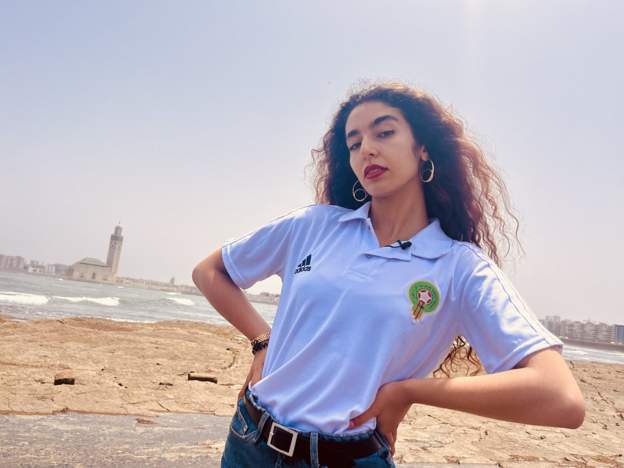She was born in Morocco, grew up in France, spent time in Spain and now lives in the UK. She sings in Darija, French, Spanish and English.
L’Oujdia incorporates wide-ranging musical traditions, including the use of a baroque recorder which she was taught at a French classical music academy.
Quote Message: As a child who’s born in a country but grew up in another it can be hard to connect to your original culture. But I think I’m very lucky because my parents have always made it their mission to bring a part of Morocco in our house. We would listen to Moroccan music, we would eat Moroccan food, we would talk in our language – even though as a kid I didn’t want to!”
As a child who’s born in a country but grew up in another it can be hard to connect to your original culture. But I think I’m very lucky because my parents have always made it their mission to bring a part of Morocco in our house. We would listen to Moroccan music, we would eat Moroccan food, we would talk in our language – even though as a kid I didn’t want to!”
As an adult, L’Oujdia is devoting herself to exploring the culture of her parents and reshaping it:
Quote Message: Identity-wise we need to know who we are. I think when someone is trying to get back to their roots it’s a beautiful thing and we shouldn’t criticise people even though they might be struggling with their own language, their own culture.
Identity-wise we need to know who we are. I think when someone is trying to get back to their roots it’s a beautiful thing and we shouldn’t criticise people even though they might be struggling with their own language, their own culture.
Quote Message: The song that represents the most my kind of music is Mujer Cobra. You’ll find some Latin percussion, some reggaeton, some flamenco and also some reggada – which is the rhythm from my region, L’Oujda. There’s a bendir which is a traditional instrument as well.
The song that represents the most my kind of music is Mujer Cobra. You’ll find some Latin percussion, some reggaeton, some flamenco and also some reggada – which is the rhythm from my region, L’Oujda. There’s a bendir which is a traditional instrument as well.
Quote Message: I definitely think our vision of our culture is changing, I think it is changing for the better. I feel like my generation is making a lot of progress into accepting who we are, not conserving that complex of ‘Europeans are superior’. I think we are breaking finally what we were taught in history, even in school.”
I definitely think our vision of our culture is changing, I think it is changing for the better. I feel like my generation is making a lot of progress into accepting who we are, not conserving that complex of ‘Europeans are superior’. I think we are breaking finally what we were taught in history, even in school.”
An example L’Oujdia gives of how young people are shaking off a colonised mentality is in their rejection of the word “Berber”.
Perhaps the majority of Moroccans have indigenous blood in their veins, and yet it is only recently that they are refusing to describe themselves with a name given to them which has very negative connotations: “Berber” is derived from the same root as “barbarian” and “barbaric”.
“The correct word is Amazigh,” says L’Oujdia.
Quote Message: We don’t find a lot of our culture in google, a lot of it is word of mouth, and what you find in your own family – so I’ve been pushed to ask more and to learn more, and become more conscious about my own position. Because I don’t want to be someone who wants to represent Moroccans who grew up in Morocco – I can’t do that, it would be ignorant of me to do so.”
We don’t find a lot of our culture in google, a lot of it is word of mouth, and what you find in your own family – so I’ve been pushed to ask more and to learn more, and become more conscious about my own position. Because I don’t want to be someone who wants to represent Moroccans who grew up in Morocco – I can’t do that, it would be ignorant of me to do so.”
To hear the full interview with Rita L’Oujdia, and to hear her music, listen to This is Africa online here: bbcworldservice.com/thisisafrica
